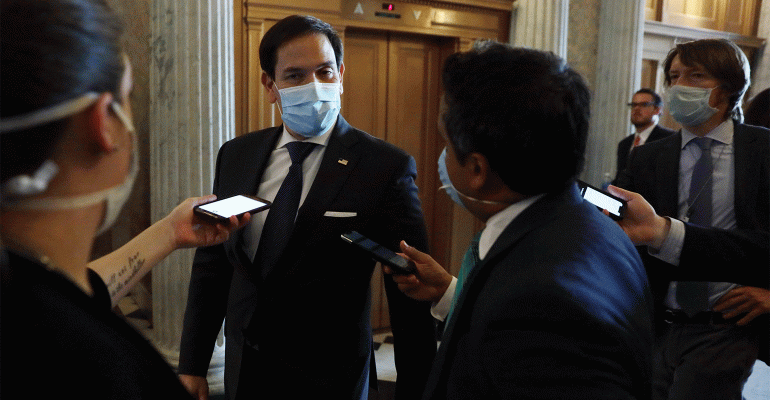Several bills that would benefit restaurants gained ground in Washington, D.C. this week.
The Senate was reportedly close to approving long-sought changes to the Paycheck Protection Program, or PPP, which has proven problematic for restaurants as they slowly return to dine-in operations. Reports, however, said it wasn’t clear whether a vote would come before or during the Memorial Day break.
Timing is key for those who applied for PPP loans when the program first launched in April. Under the existing terms, the eight-week period would be close to an end. Many restaurant operators have held off on signing paperwork to delay starting the clock — particularly in states where dine-in restrictions have yet to be lifted or capacity has been severely limited, hampering employers’ ability to rehire staff.
Under the bipartisan bill introduced Thursday by Sen. Marco Rubio (R-Fla.), businesses would be given 16 weeks, rather than the current eight, to use their PPP loan funds and still be eligible for forgiveness.
The bill, which is supported by Sen. Ben Cardin (D-Md.), would also give employers until December to apply for the loans, instead of ending the program in June.
Under the current program, 75% of PPP funding must be used for payroll to earn forgiveness. But Rubio’s bill would offer more flexibility for use of the loan, allowing operators to use it to buy protective gear for workers, for example, one of many new expenses resulting from the ongoing pandemic.
Restaurant executives met with President Donald Trump on Monday at the White House, urging his support for changes to the PPP program, and Treasury Secretary Steve Mnuchin indicated that fixes were in the works.
The Senate bill, which must be approved by the House, falls short of changes to the PPP program sought in a House bill approved last week called the Health and Economic Recovery Omnibus Emergency Solutions, or HEROES, Act.
The PPP enhancements are part of a $3 trillion stimulus bill championed by Democrats that would also extend unemployment benefits and offer more direct cash payments to households. Leaders of the Republican-controlled Senate have declared the HEROES Act dead on arrival.
But pieces of the legislation may survive. The HEROES Act, for example, would also push the PPP program deadline for rehiring workers from June 30 to Dec. 31, but would extend the covered period from eight to 24 weeks — going even further than Rubio’s Senate bill. It would also carve out 25% of funds for small businesses with 10 or fewer workers.
In a separate bipartisan effort, Reps. Dean Phillips (D-MN) and Chip Roy (R-Texas) last week introduced the Paycheck Protection Flexibility Act, or HR 6886, that would also redesign the PPP program to make it more user friendly, including allowing forgiveness for expenses beyond the eight-week covered period and eliminating the 75%-for-payroll rule.
Separately from the bills focused on the PPP program, another lawmaker is seeking more financial support for restaurants specifically.
Rep. Earl Blumenauer, D-Ore., this week introduced a bill that would create a $120 billion restaurant stabilization fund to be administered by the Treasury Department. The fund would offer grants of up to $10 million for foodservice or drinking establishments that are not publicly traded or part of a chain with 20 or more locations doing business under the same name.
The Independent Restaurant Coalition, or IRC, sent a letter to Congress in April saying the fund was vital for the restaurant industry’s survival.
“The Paycheck Protection Program for independent restaurants is like building a bridge that doesn’t reach across the water,” the IRC said in a statement. “A stabilization fund will reach the other side and get us through this crisis.”
CORRECTION: This story has been updated to correct the spelling of Marco Rubio.
For our most up-to-date coverage, visit the coronavirus homepage.
Contact Lisa Jennings at [email protected]
Follow her on Twitter: @livetodineout





